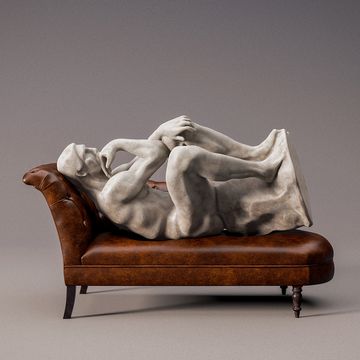Men are evolving. The old bottle-it-up and drink-it-away approach to dealing with psychological or emotional distress has shifted to a new talk-it-through strategy: 42 percent of men ages 18 to 32 view the shrink’s couch as an essential part of wellness, according to a 2014 millennial health survey.
“Men are starting to realize that talking about their feelings can help them live happier, healthier lives,” says Ronald Levant, Ed.D., a cofounder of the Society for the Psychological Study of Men and Masculinity.
Read on to figure out if you might benefit from a couch confessional.
Related: The Better Man Project—2,000+ Essential Tips for Living a Kick-Ass Life
How to Know When You Need to See a Therapist
Sadly, there’s no blood-pressure equivalent for mental health. But if you feel like you’re losing control of life, a therapist can help you seize the helm.
“The word I use is ‘stuck,’” says Joel Wong, Ph.D., a professor of counseling psychology at Indiana University. “Most of my male clients came to me when they were caught in a rut they couldn’t seem to get out of.”
Problems with anger or alcohol could be cause for the couch, but don’t feel you have to pinpoint the issue, says MH mental health advisor Thomas Joiner, Ph.D.
“Do you have a problem that’s affecting your ability to function? Is it costing you jobs? Relationships? It doesn’t matter where it came from. It’s important to get help.”
Therapy vs. Antidepressants
You should think of antidepressants as the remedy of last resort. Sure, they can be useful in some cases. But they also come with the potential for side effects, including insomnia, weight gain, and sexual problems.
And they’re already overprescribed in the United States: A recent study published in the Journal of Clinical Psychiatry reported that nearly 70 percent of people taking antidepressants did not meet the criteria for clinical depression.
But more to the point, a therapist can help you develop strategies for overcoming any negative thought patterns and destructive behaviors you might have, and that’s something no pharmaceutical remedy can do.
Or, as Wong puts it, “Pills don’t teach skills.”
Related: 20 Secrets to a Happier Life
Picking the Right Kind of Therapist
A counselor or a licensed social worker will give you a solid intro to talk therapy, says Joiner.
And if it turns out you need more help, he or she may refer you to a psychologist (a Ph.D. or Psy.D. who can diagnose and treat mental illness) or a psychiatrist (a medical doctor who can prescribe medication).
If you’re worried you’ll choose the wrong therapeutic discipline—cognitive behavioral therapy, experiential therapy, and so on—don’t be.
“Rapport with the therapist is way more important than the specific technique,” says David Wexler, Ph.D., executive director of the Relationship Training Institute in San Diego.
To boost your odds of success, chat with a few prospective therapists on the phone before making an appointment.
What You’ll Talk About In a Therapy Session
Don’t worry. You’re not on trial. The agenda is looser than you might expect, says Wexler.
A good therapist just wants to make you feel comfortable so you can speak on your own terms.
But say you do freeze up. Ask about “triangle conversations,” where the client and therapist engage in a common task, such as playing cards.
“The ability to focus on the game instead of the counselor often allows men to talk more freely,” says Wexler.
Or consider email or video chat. A study in the Journal of Affective Disorders found Internet-based therapy to be as effective as face-to-face sessions in treating depression. Find an online therapist at breakthrough.com.
The Cost Of Therapy
It’s definitely less than the cost of a mental meltdown. Paying out of pocket, you may fork over as much as $300 for a single session, but many will charge you something in the range of $75 to $150 per visit.
Your health insurance is likely to foot a big chunk of the bill, but confirm that your plan covers your treatment before you’re on the hook.
Related: 6 Surprising Benefits Your Health Insurance May Cover
Your company may even offer an employee assistance program that provides free access to short-term counseling.
Still worried? Consider how much you’ll save over medication: Researchers at the University of Washington found that people who went to therapy instead of taking meds spent about 40 percent less on treatment over 16 months—and the results lasted longer.
Does Your Therapist’s Gender Matter?
Try not to focus on gender. (If you can’t help it, then you have a lot to talk about on the couch.)
A study in the journal Psychotherapy suggests that the therapist’s gender doesn’t affect treatment success, so ask around among people you trust for recommendations.
Still, some men may be more comfortable with a woman, and there may be scenarios in which a woman may have the edge.
“If a man has gone through a difficult breakup or is having trouble understanding his wife, a female counselor might provide a better opportunity to work through those problems,” says Joiner.
If you prefer to work with someone who specializes in treating men, do a search at locator.apa.org.
Your Therapy Schedule
“There’s a chance we could talk through everything in one session,” says Fredric Rabinowitz, Ph.D., a professor of psychology at California’s University of Redlands.
It’s more likely, however, that you’ll need at least a couple months of weekly therapy: A Journal of Counseling Psychology study found that the first couple of sessions have the biggest impact, and that the rate of improvement slows with each additional session.
But it’s not a one-size-fits-all plan: Some people need as few as three sessions, while others in the study took 26 or more.
Regardless, don’t delete your therapist’s number when you’re done. Many men find it useful to go back once or twice a year for a mental checkup, says Rabinowitz.
How Therapy Helps You Deal With Job Stress
You probably spend as many hours at work as you do at home—if not more—and that time can have a huge impact on your well-being. “A job-related problem is actually a great reason to seek counseling,” says Wong.
Heck, therapy can actually give you a leg up at the office: U.K. researchers found that 13 weeks of cognitive behavioral training significantly increased workers’ job satisfaction and self-esteem.
Even their productivity improved: 65 percent of the employees performed at or above average compared to their coworkers for two years after the therapy sessions.
What Therapy Does to Your Sex Life
When do you most feel like getting busy: When you’re happy and relaxed, or when you’re stressed and tense? Exactly.
Studies show that anxiety and depression can make men more likely to go limp in the bedroom.
In fact, ED meds seem to be more effective when combined with therapy, according to researchers in Switzerland.
Related: Erectile Dysfunction: Everything You Need to Know
And if the problem stems from sexual anxiety, counseling can help you communicate and empathize with your partner—a strategy that can ultimately relieve some of the performance pressure.
“Connecting behavior, such as listening and emotional vulnerability, can be the greatest foreplay of all—especially for women,” says Wexler.
That’s right: You can earn credit without lifting a finger!
Will Your Therapist Try to Make You Cry?
Relax, it’s not as if anybody’s getting a kickback from Kleenex.
If you do tear up, know that lots of men turn weepy in therapy. They may not be used to talking about emotions, and doing so can feel overwhelming, says Rabinowitz.
Related: The Weird Science Behind Why We Cry
In fact, a little sobbing gives you some extra bang for your therapy dollar: A Dutch and Croatian study suggests that crying may cause your parasympathetic nervous system to engage and your brain to release oxytocin, inducing relaxation and improving mood.
And researchers at the University of South Florida found that tearing up in the presence of another person (like your therapist) can lead to a greater mood boost than flushing your ductwork by yourself.













